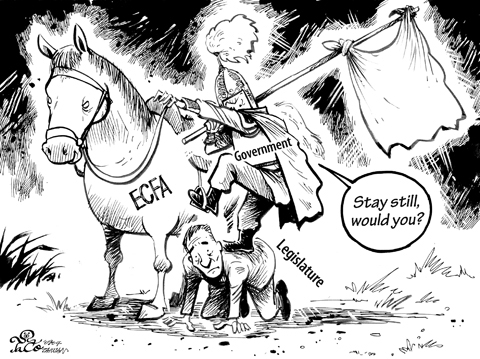|
|
| A LESSON IN
DEMOCRACY Members of pro-localization organizations march in Kaohsiung to protest against the national government for ‘’selling out Taiwan.’’ The banner reads “April 19 demonstration to teach Ma Ying-jeou a lesson.” PHOTO: HOU CHENG-HSU, TAIPEI TIMES |

Ugly free expression
Monday, Apr 20, 2009,
Page 8
This past week my family visited Sun Moon Lake (日月潭). As a Canadian it is hard
to be impressed by a lake, but Sun Moon Lake proved spectacular and I enjoyed
the visit very much except for one small incident.
Climbing a set of stairs on one if its shoreline temples, I came across a Falun
Gong display. Now before anyone interprets this letter as a statement either for
or against Falun Gong, please understand that it is not. While I have obvious
sympathies for any group that experiences hardship, what this letter is about is
freedom of expression and what limits there should be, if any.
What disturbed me was not the message, but how it was being delivered. Part of
the display included very graphic images of dead bodies, including a pregnant
woman with parts of her skin and flesh removed revealing an unborn child within
the womb.
The image was so explicit that anyone would be left shocked; this was obviously
the photograph’s purpose.
As an adult I do not appreciate being randomly exposed to these types of images,
even if I am mature enough to handle the experience.
That said, I doubt my two-year-old daughter or her five-year-old cousin have the
necessary faculties to avoid being traumatized by such photographs.
The American Academy of Pediatrics, as well as other institutions, has published
findings that clearly show the negative effects of such imagery on children and
youth. Testifying before a US Senate Committee in 2000, the group’s president
stated the following:
“Since the 1950s, more than 3,500 research studies in the United States and
around the world using many investigative methods have examined whether there is
an association between exposure to media violence and subsequent violent
behavior. All but 18 have shown a positive correlation between media exposure
and violent behavior.”
Perhaps this is why, as a high school teacher, I am not allowed to show these
types of photographs to my teenage students, and would be appropriately
disciplined if I did so.
I had my wife translate my concerns. Unfortunately, the group’s representatives
literally stood by the right for the photographs to be shown publicly. With my
opinion so quickly — and ironically — dismissed I was left frustrated, but
through this letter I hope that my freedom of expression can help correct what
is an obvious abuse of it.
PAUL GALLIEN
Taipei
The TRA: Taiwan’s crutch?
In this year’s edition of the Pentagon report Military Power of the People’s
Republic of China, there is a sentence referring to the shifting dynamics in the
Taiwan Strait that says: “Since 2000, there have been two peaceful political
transitions on Taiwan and a gradual and steady maturation of Taiwan democracy.”
There was, therefore, no shortage of irony when President Ma Ying-jeou’s (馬英九)
government held a weeklong commemoration of Chiang Ching-kuo (蔣經國), the dictator
of White Terror infamy.
Ma’s yearning to morph a democracy into an autocracy and then a dictatorship to
facilitate his dream of unification appears to have given rise to galvanization
of a fractured and feeble opposition.
Following joint sessions poring through state affairs, the leadership of both
the Democratic Progressive Party and the Taiwan Solidarity Union promised to
hold a demonstration to give backbone to demands that amount to a full-scale
condemnation of Ma’s handling of Taiwan’s sovereignty.
Failure of this effort to dissuade Ma could mark the beginning of more frequent
and escalating confrontations centering on the future status of the nation —
developments that would portend revolution in many cultures.
One of the merits of democracy is the elimination of the necessity for
revolution.
But Taiwan’s democracy is far from normal. It’s not founded on concrete
prospects for sovereignty. Rather, any growth in Taiwanese sovereignty goes in
lockstep with growth in democracy. But without a Constitution to enshrine them,
the loss of such rights could be just one ballot away — as Ma’s election may
attest.
The only thing that guarantees Taiwan’s existence in practical terms is the US’
Taiwan Relations Act (TRA).
The TRA, however, has no safeguard against the likes of Ma. The drafters of the
TRA didn’t foresee one because the KMT leadership of the day avoided communism
like the plague. Neither did the drafters make allowances for the dynamics of
democratization.
Washington nowadays exploits this omission rather than making amends in the form
of policy encouraging democratic mechanisms (such as referendums) that would
help to determine Taiwan’s future.
Washington would now use its duty to enforce the TRA as leverage to pressure
Taiwanese into abandoning their right to self-determination if this suited its
interests.
The TRA, as a US law, implies a degree of US sovereignty over Taiwan, but makes
no reference to it.
Anecdotal evidence nonetheless indicates that the vast majority of Taiwanese
believe that Washington has their best interests at heart and that the US would
stop Ma and company from committing treacherous acts. Most of all, they trust
that the US would prevent China from harming them.
As a result, Taiwanese have lost their vigilance. They have become careless in
their exercise of democracy. They are slack on defense. They engage in
recklessness that runs counter to national security interests — and all for
monetary gain.
By meddling in Taiwan’s domestic affairs, including the installing of a ceiling
on Taiwan’s democratic development and influencing presidential elections,
Washington might be inadvertently turning the TRA into a crutch for Taiwan.
The belated awakening of Taiwanese from this state of affairs could coincide
with violent rejection of Ma’s rule.
HUANG JEI-HSUAN
Los Angeles, California